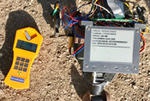Erasmus Prize for Bachelor thesis on radiation sensor technology
Direktzugriff
Artikelaktionen
The developed radiation detection robot beside a commercial Geiger counter
Jeremy Fon Sing's bachelor thesis on “Nuclear Radiation Detector, Robot Design and its Social Impact” is awarded the “Erasmus Prize for the Liberal Arts and Sciences.” The work in the “Liberal Arts and Sciences” program was jointly supervised by Dr. Reto Schölly from University College Freiburg and Dr. Jochen Kieninger from the Laboratory for Sensors (Prof. Gerald Urban) at IMTEK. The award ceremony will take place in a festive celebration, subject to change, in July.
The aim of the thesis is to discuss technical developments and their reception in society, and at the same time to show how knowledge can be acquired through a playful approach to technology. Mr. Fon Sing's work shows that with simple setups, radioactive radiation can be measured even by people without being educated in engineering sciences. The technical part of the thesis dealt with the detection of radioactive radiation with a semiconductor sensor, the integration of such a sensor into a robot, hardware-related software development, and simple test measurements with low-level radioactive samples or the natural background radiation. The social aspect’s focus of the work was on the ambivalence between diffuse, often unfounded fears of people on the one hand, and highly dangerous radiation exposure on the other side. Such as it occurred, for example, after the catastrophe in Fukushima and when the public had only insufficient data but, above all, inadequate knowledge. Finally, this was the reason for projects in the field of citizen science, which not only lead to better education of society but from which social movements can emerge that provide reliable data.
The prize awarded to Mr. Fon Sing is for a bachelor's thesis that is a landmark work for a series of other projects being carried out in cooperation between the Laboratory of Sensors and the University College Freiburg. These activities are an excellent opportunity to show how sensor technology and a solid understanding of the measurement principle and measured data can be used to uncover false or “alternatively” interpreted facts – and that the engineering sciences and humanities are pulling in the same direction.
Dr. Jochen Kieninger
IMTEK – Department of Microsystems Engineering
Laboratory for Sensors
email: kieninger(at)imtek.uni-freiburg.de
Dr. Reto Schölly
University College Freiburg
email: contact(at)reto-schoelly.com
Fußzeile
Benutzerspezifische Werkzeuge

